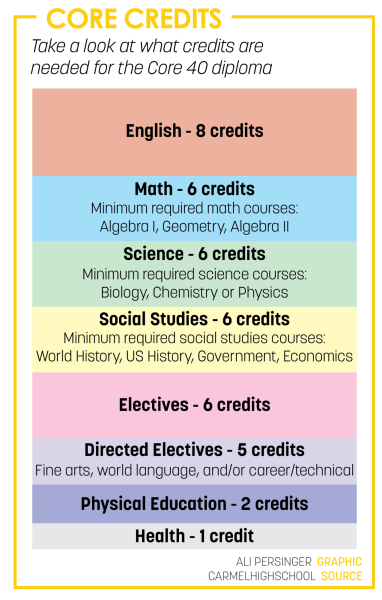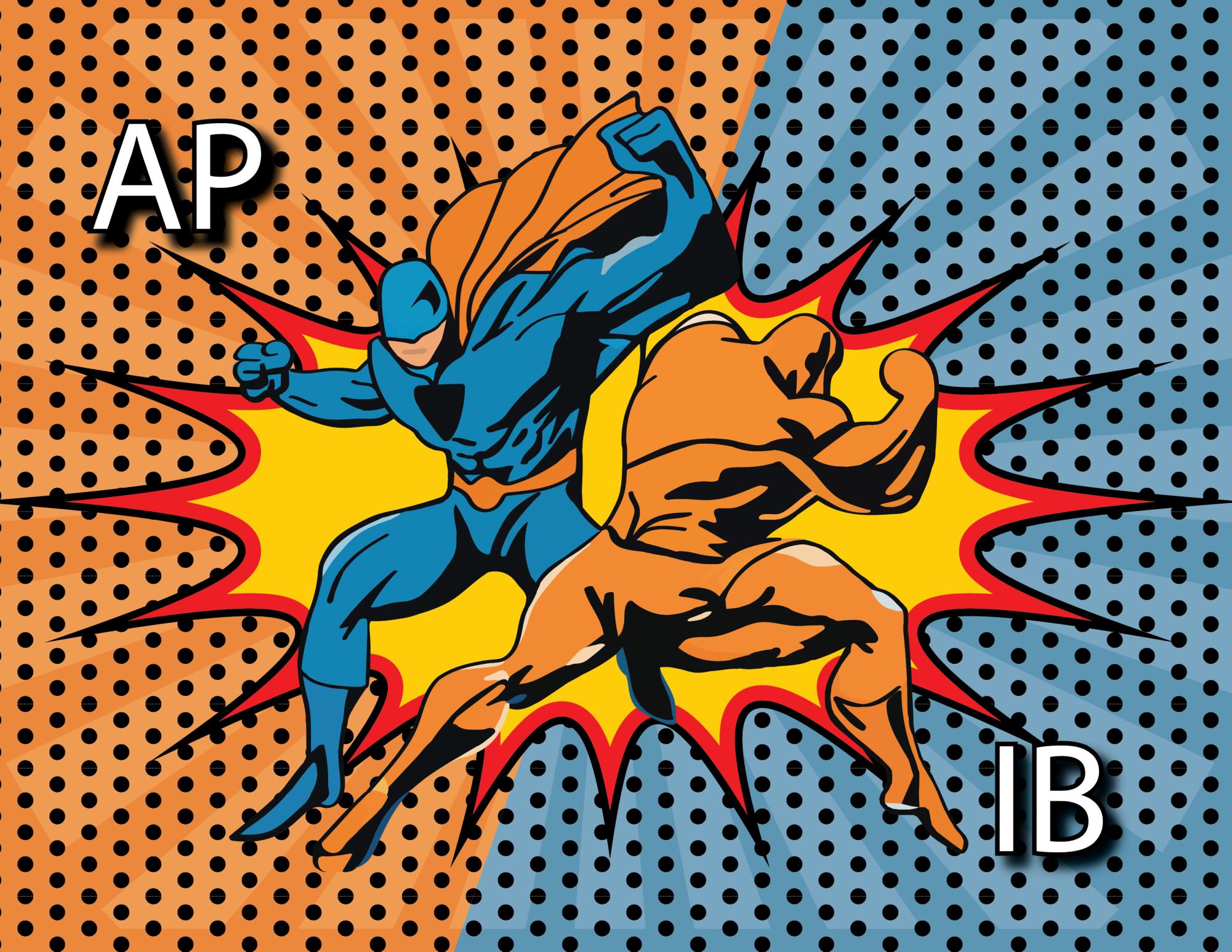According to the College Board, the Advanced Placement (AP) program is defined as “college-level courses and exams that you can take in high school.” The International Baccalaureate define the International Baccalaureate (IB) program as a program that “offers opportunities to develop both disciplinary and interdisciplinary understanding that meet rigorous standards set by institutions of higher learning around the world.” These two programs are often seen as the two sides of the spectrum when it comes to the high-achieving student population.
Generally, school counselor Casey Danubio said the students who tend to take AP and IB courses could largely be categorized as high-achieving.
“(The students that look toward AP and IB courses are) students who are looking to take our most rigorous coursework,” Danubio said. “They want the full-weight, they want the option to take an AP exam, they’re working towards capstone or academic honors, they’re hoping to earn college credits prior to going to college. So, high-achieving, wanting college-preparatory (courses) students.”
Katie Overbeck, International Baccalaureate diploma program coordinator at CHS agreed, “There are a lot of similarities between the two programs. You know obviously, AP is a United States based program and IB comes to us out of Europe but the premise of both is to prepare students for college.”
But even though students who work within these programs tend to have similar characteristics, students who take those classes have generated some stereotypes between the class distributions.

Junior Ava Luckenbill, who is working toward the IB diploma, said, “(I’ve) heard a lot of people say that (the IB program is) easier than (the) AP (program). I would be careful saying that because it’s not necessarily easier. The coursework is about the same, like, we still have to do a lot of work, still have to do a lot of out-of-school work, we do exams, we do all the same that kind of stuff. It’s more along the lines of do you work better in a very structured classroom or do you work better with a bit more freedom to do what you please.”
Danubio said she also encountered these impressions from students.
“There definitely seems to be a thinking that IB is easier than AP; I don’t know if that’s true, I’ve never taken an IB class,” Danubio said. “I do get that sense when I meet with kids sometimes, that their impression is that taking an IB class compared to an AP class is more manageable, but I also think that it’s the type of learner that you are. If you’re someone who really likes to work in groups and you want to spend a lot of time on a certain subject area, then you might really enjoy IB. If you want to move through the curriculum, if you want to be given the information, you want to memorize, you just want to prepare for the test, then students seem to really like AP.”
However, Overbeck said the actual differences are different from what students perceive.
“The difference, is that within IB, they have some additional expectations that students will have a globally focused curriculum and so in all of our courses there’s kind of a forced global mindedness. In addition, in all the IB classes, there is an independent element, an individual investigation where a student is asked to pick something that they’re interested in, in that subject matter and individually investigate it. That isn’t necessarily a feature of all the AP courses, so individual investigation and global mindedness are definitely two differences within IB classes compared to AP classes.”
Danubio said there were multiple reasons why students choose one program over the other, but the main factor students take into consideration when choosing their path is what type of learner they are.

“Really when we talk about those types of programs, it’s really the type of learner and how they like to learn,” Danubio said. “So, for IB classes, there’s going to be more class discussion, you’re going to go deeper into the subjects and the content you’re going to be discussing in class. There’s more group work; it’s more discussion-based, more of an in-depth dive. For AP, it’s, again, a very structured class—both (IB and AP) are worth five GPA points, so there are some similarities—it’s just going to be more giving you the factual information to prepare you for the AP exam, more straightforward, less of a deep dive, covering more content.”
Senior Akul Chinthala, who is working toward the AP Capstone diploma, said he agreed with Danubio.
“(AP classes) help prepare you—they’re supposed to be college prep classes—but IB is more aimed to help you become more interconnected with the different subjects and understand the concepts beyond the classroom, but in different activities,” Chinthala said. “I’d say IB is more interactive projects, and it’s different projects that you do for the class, but AP is more (of) different assignments and less interactive. IB gives students a better understanding within your subject and it’s (a) more interactive type of classroom. You work with other people more and it’s more project-based.”
Luckenbill said she agreed with Danubio and Chinthala about the differences between learning in AP and IB classes and said her preferences for types of learning led her to choose the IB program.
“I really liked the way the teaching style was for IB which was more like project-based and a lot less intense instruction,” Luckenbill said. “Like, we get a lot more freedom to do things and I was really interested in pursuing that.”
Chinthala said a large factor in why he chose to work toward the AP Capstone diploma and not the IB diploma is because of his post-high school plans.
“I found more use in applying AP (skills),” Chinthala said. “I want to study in America so there’s a lot of different concepts and curriculum similarities between American colleges and AP that’s provided. (IB) is better for people who want to study abroad.”
Luckenbill said the IB program also allowed for developing new skills that are beneficial in college and work life.
“It’s a lot of learning on how to manage your time, like figure out, ‘Ok, this is what I need to do for this if I want to do this later,’ it’s a lot of responsibility,” Luckenbill said. “We have to do something called a CAS project, which is a big leadership project, so it’s learning how to take charge in your community and lead projects and learn management, so it’s a lot about good general life skills you want to have.”
Danubio said there were a variety of reasons why students choose the IB program over AP.
“What kids like about the IB program is that it’s very structured,” Danubio said. “It’s a two-year program, and we’re lucky that we offer such a variety of IB courses. Many schools don’t have so many choices. We have a really wonderful IB coordinator, (Katie) Overbeck, who will sit with you in the beginning of your junior year and end of sophomore year, and help map out your two years so you know exactly what you’re going to be taking, and we work very hard to make sure all those things can fit in so you graduate on time, so that you’re hitting all the requirements of the IB diploma.”
Overbeck agrees, emphasizing that ensuring students hit all the requirements for the IB diploma is essential for scheduling.
“If a student is really going to do the full IB diploma, that’s when they route through me. I work then as kind of a secondary counselor or advisor to that student and I work with them to make sure that, that student is meeting the requirements of the IB diploma pathway and their counselor here in the building is still making sure they’re getting the requirement for the state of Indiana pathway,” Overbeck said. “So we work together with those students and so if a student is interested in the full IB diploma option, then they really sign up for an appointment with me, and then, with their counselor we work that schedule out together.”

Luckenbill said the benefit of the IB program is the flexibility the classes allow students.
“Well, you get a distinction on your diploma if you succeed in completing all the requirements,” Luckenbill said. “You get a lot of freedom as you work. There’s harsh deadlines but (it’s) mainly for overall completion rather than having parts have harsh deadlines, so you get a lot of freedom to how you do your work and (how) you want to structure all that out.”
Danubio said many students that are here internationally or maybe want to study internationally or travel abroad find the IB program appealing.
“I would say there are definitely benefits to both (AP and IB),” Danubio said. “At the end of the day, it’s kind of just a different type of learning. You can take IB classes without earning the IB diploma, which I think is really great too. I think a lot of students don’t know that.”
Chinthala said the AP program provided similar benefits to the benefits Luckenbill said the IB program had.
“AP provides great college-prep,” Chinthala said. “It’s really nice; you get to experience what the curriculum is going to be like when you get to college and you get to experience the type of pace that colleges go as well.”
Danubio said the college preparation AP classes provided for students was a big benefit.
“Obviously taking AP classes and sitting for the exam, all these things help you earn your academic honors diploma, if that’s one of your goals, or your Capstone (diploma),” Danubio said. “(AP classes) are college-level courses, so (they are) rigorous courses that are worth five points (and) will prepare you, and also look very good for admissions purposes.You can also sit for the AP exam in May and potentially get a score that may get you college credit in the future, so that’s good.”
Danubio said even though the IB and AP programs seem to be very different, the two programs have many similarities.
“(AP and IB) are both college-level courses,” Danubio said. “They’re both full-weight, they’re both college-preparatory. They obviously look very good on your transcript; they’re preparing you for that college-level work. For both of those programs, you can take an exam in May at the end of the year, when you’re done with the class, so you can sit for those exams and potentially earn—if you earn a certain score—college credit depending on where you go to college. That’s a good money-save (and) time-saver.”
Despite these similarities, the majority of students have still chosen to work toward the AP program rather than the IB program. This school offered 36 IB courses and 35 AP courses in 2022. However, despite the similar number of courses offered, only 654 students took IB courses last year versus the 1,887 students who chose to take AP courses.
“I think that again, just culturally (AP) is just something students are more used to and something they know more about, and if they’re wanting to earn the Capstone, which is very popular distinction to earn at Carmel High School, that’s useful towards that,” Danubio said. “I think they’re just more familiar with AP and they know more about it (than IB). The IB program is really two years, and you don’t have a lot of room for other courses. It’s very packed with the IB, with the SLs and HLs you need to earn the certificate, so I think (that) students think there’s more flexibility with AP.”
Danubio did say more students have expressed interest in the IB program as more of them are introduced to it.
“I do think IB is a little more up-and-coming, people just don’t know as much about it,” Danubio said. “I think more students are familiar and feel comfortable with AP so that’s kind of just been our culture here at this school, but I have seen a shift over the last couple years where more kids are interested in the IB program, it’s really been growing, so I think that’s great too.”



